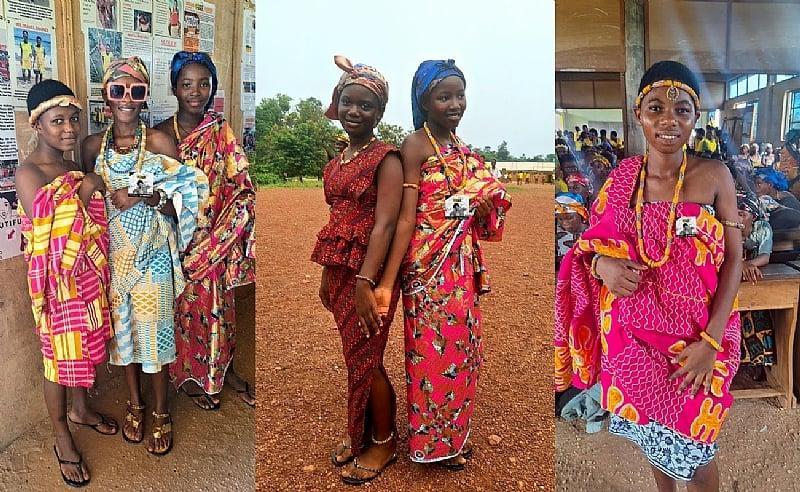Unveiling Ghana’s Tapestry: A Cultural Exploration of Marriage, Dance, Festivals, Language, and Funeral Traditions
Table of Contents
- 1 Unveiling Ghana’s Tapestry: A Cultural Exploration of Marriage, Dance, Festivals, Language, and Funeral Traditions
- 1.1 Meta Title: Ghana’s Cultural Riches: A Tapestry of Marriage, Dance, Festivals, Language, and Funeral Rites
- 1.2 Meta Description: Immerse yourself in the vibrant tapestry of Ghanaian culture through its captivating marriage rituals, spirited dances, colorful festivals, diverse languages, and profound funeral traditions.
- 1.3 Marriage Traditions: A Sacred Union
- 1.4 Dance Forms: A rhythm of Life
- 1.5 Festivals: A Kaleidoscope of Colors
- 1.6 Languages: A Symphony of Words
- 1.7 Funeral Traditions: Honoring the Departed
- 1.8 Conclusion
Meta Title: Ghana’s Cultural Riches: A Tapestry of Marriage, Dance, Festivals, Language, and Funeral Rites
Meta Description: Immerse yourself in the vibrant tapestry of Ghanaian culture through its captivating marriage rituals, spirited dances, colorful festivals, diverse languages, and profound funeral traditions.
Introduction
Ghana, a nation humming with vibrant cultural rhythms, is a melting pot of diverse ethnic groups, each weaving intricate threads into the country’s cultural tapestry. This article embarks on a journey to unveil Ghana’s rich heritage through its engaging marriage traditions, exhilarating dances, colorful festivals, multifaceted languages, and solemn funeral customs.
Marriage Traditions: A Sacred Union
In Ghana, marriage is a sacred union held in high esteem. Traditional marriage ceremonies follow customary practices that vary among ethnic groups.
- Proposal and Bride Price: A potential suitor typically presents gifts to the bride’s family, seeking permission to marry her.The bride’s family accepts by setting a bride price,paid by the groom’s family to symbolize the bride’s value.
- Traditional Marriage Rituals: Weddings are often elaborate affairs, rich with symbolic rituals. The ceremony may include libation pouring, exchange of rings, and a blessing from elders.
- Post-Marriage Customs: After the wedding, the couple settles into a new home, often with the groom’s family. The bride integrates into her husband’s community, participating in social and communal events.
Dance Forms: A rhythm of Life
Ghanaian dance is a pulsating heartbeat of the nation’s culture, expressed through various traditional and contemporary styles.
- Traditional Dances: Each ethnic group has its distinctive dance styles, such as the spirited Adowa from the Akans, the rhythmic Klama from the Ewes, and the energetic Damba from the Dagombas.
- Contemporary Dance: Ghana has also embraced modern dance forms like hiplife, Afrobeats, and contemporary ballet, creating a fusion of tradition and innovation.
- Dance Festivals: Numerous dance festivals showcase Ghana’s rich dance heritage, including the National Dance Ensemble Festival and the Ghana Dance Festival.
Festivals: A Kaleidoscope of Colors
ghana’s festivals are vibrant spectacles that celebrate culture, religion, and history.
- Traditional Festivals: Traditional festivals, such as the homowo (Ga), Bakatue (Nzema), and Akwasidae (Akan), commemorate events, harvest, and ancestors.
- National Festivals: Ghana observes national holidays like Independence Day, republic Day, and Kwame Nkrumah Memorial day, celebrating the country’s history and resilience.
- Cultural Festivals: Ghana also hosts international cultural festivals like the Pan-African Ancient Theater Festival and the Chale Wote Street Art Festival,fostering artistic exchange.
Languages: A Symphony of Words
Ghana is a multilingual nation, with over 70 indigenous languages spoken.
- Official language: English is the official language of Ghana, used in goverment, education, and media.
- Local Languages: The most widely spoken local languages include Twi, Fante, Ga, and Ewe. Each language has its distinct vocabulary, grammar, and cultural nuances.
- Pidgin English: Pidgin English, a simplified form of English, is widely used as a lingua franca for dialog among different ethnic groups.
Funeral Traditions: Honoring the Departed
ghanaian funeral customs are deeply rooted in spirituality and communal support.
- Death rites: Upon the death of a loved one, the extended family gathers to perform rituals like pouring libation and sharing memories.
- Wake-Keeping: A wake-keeping is observed for the deceased, allowing the community to pay their respects and offer support to the bereaved family.
- Burial and Mourning: The deceased is buried in a family plot, with specific rituals and customs observed. Mourning practices vary in length and intensity,but often involve black attire and expressions of grief.
Conclusion
Ghana’s vibrant tapestry of culture is an remarkable symphony of traditions, artistry, and language.Through its captivating marriage rituals, spirited dances, colorful festivals, diverse languages, and profound funeral customs, Ghana showcases its rich heritage and continues to captivate the hearts of its people and visitors alike. By embracing and preserving these traditions, Ghana ensures that its cultural tapestry continues to shimmer for generations to come.

